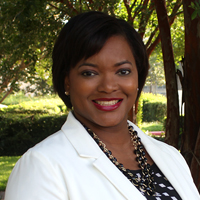
University Career Services virtually connects students and employers
DSAES News
July 21, 2022

Dr. Monica Thompson
When the University of Houston campus first shut down in March, staff in University Career Services (UCS) remained optimistic about how the pandemic would affect not only the job market, but also how UCS would manage recruiting events. But they were also pragmatic. They knew that if cases didn’t go down, there would be no way they could host the career fairs and other events they already had on the calendar. That realistic take on the impact of COVID-19 not only saved the career fairs, but it’s also opened up a new, virtual way of connecting students with employers. The virtual career fairs that UCS hosted over the past few weeks have been so successful, in fact, that other universities and colleges have reached out to learn how they did it.
It was no easy feat, said Dr. Monica Thompson, director of UCS. “We were literally figuring it out as we were going,” she said.
It may not have been easy, but it was definitely a success. The first-ever University of Houston Virtual Recruiting Event through MS TEAMS was held on May 27, 2020, with 27 companies and 144 students logging in to connect. And even better: UCS already has confirmation of some students getting hired from the event.

Caitlin Deis
“I was so proud of our team for working together to develop the platform, instructions for both students and employers, and executing a great event that provided career opportunities!” said Caitlin Deis, assistant director of employer development and relations at UCS. “We were innovative and didn’t let COVID stop us from supporting student success.”
It may sound simple to say that they moved an in-person career fair to Microsoft Teams, but it wasn’t that easy. During a typical face-to-face career fair, employers have a designated booth that students can walk up to, introduce themselves and learn more about the company and possible job openings. The normal career fair could attract anywhere between 400 and 1,200 students, and usually around 50 employers. UCS had to figure out how to take that online in a way that still allowed employers and students to make that personal connection. Although there are a number of companies who offer a virtual career fair platform that UCS could have hired, the UH team quickly ruled them all out: They all cost too much. Those platforms, Thompson said, charged anywhere from $8,000 to $20,000 for one event. UCS had at least two career fairs they knew they needed to move online but certainly didn’t have almost $40,000 in the budget to spend. So Deis pitched something she knew University of Houston employees and students already had access to that wouldn’t cost them anything: Microsoft Teams.
UCS made the decision in mid-April that the career fair scheduled for May 27 would be held on Teams, leaving them little time to fully flesh out a virtual career fair on a platform many people at UH were still learning. First came research: Deis said staff read a lot of the Microsoft forums and watched a lot of “phenomenal” YouTube videos about the Teams platform, learning tips and tricks on how to best utilize its features. Then they developed a demo site, where they tested out different features and different apps. “Once we were happy with the demo functions, we replicated it to the official Team for the event,” she said. The biggest challenge wasn’t learning how to use Teams, she said. It was becoming comfortable enough with the platform that they could then teach employers and students how to use it for the career fair. Some of the features they included were creating a channel for each employer to act as a virtual booth with their own branding and content, along with the ability for private chats between students and employers, post announcements, and videos, among other interactive elements. This, Deis said, allowed them to mirror as much as they could an in-person career fair. The response was overwhelmingly positive from employers. In a post-event survey, most employers and students said they’d attend it again in the future, and employers praised UCS for how detailed everything was set up, making the career fairs easy and seamless.
One student is happy she attended the virtual career fair. Yasmin Zainalabdeen (BS ’20) landed a job after she logged in and connected with employers. She said she enjoyed the virtual atmosphere, because “I was able to connect with potential employers through messages and video calls and could comfortably approach them at my own pace. UCS was very helpful in facilitating the event and answered any questions I had throughout.” After that initial connection with the employer during the virtual event, she said, she followed up with an interview that same week, then a second interview the week after that. Three weeks after the career fair, Zainalabdeen said, she was offered the job. Zainalabdeen, who majored in psychology while at UH, has some tips for students attending future virtual career fairs: “In a virtual setting, it might take a bit more effort to make sure your personality comes across just as much as if you were meeting in-person,” she said. “So just like with any networking event, doing your research and preparing as much as possible allows you to go in more confidently.”
Deis is always looking for ways to improve. She said in the future, she’d re-evaluate how long the virtual fair would run. Instead of 9 a.m. to 6 p.m., she said, the ideal timeframe seems to be about three to four hours. And she’s been happy to pass on what she’s learned: UCS has been contacted by numerous college-based career centers asking for advice on setting up their own virtual career fairs. The UCS team decided to share what they’ve learned by setting up an online training resource for those interested in replicating their success. After all, Deis said, “the work we do is important to the overall mission of higher education. We wanted to empower other career centers!”
Nearly 100 professionals from Colorado, Michigan, Oregon, and UH have watched the webinar they posted online.
It was inspiring to find “that all of our hard work was recognized and seen as valuable by our colleagues,” Deis said. “It is an innovative idea that can truly help other career centers continue their mission through budget challenges due to COVID.”
Although UH is reopening when and where it is safe to do so, Thompson said UCS plans to continue offering virtual career fairs in the upcoming academic year. “The innovative approach to creating a timely opportunity through Microsoft Teams is impressive, and not only demonstrates our teams’ agility; it fits with our contribution to advance the Division’s Student Success initiative which includes championing exceptional opportunities and services to support all UH students,” Thompson said.